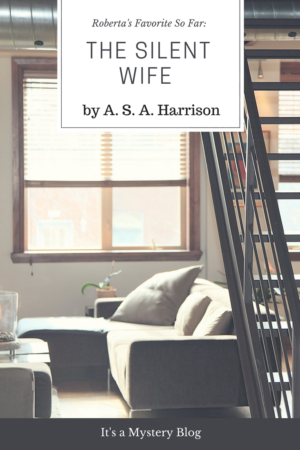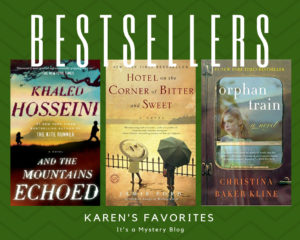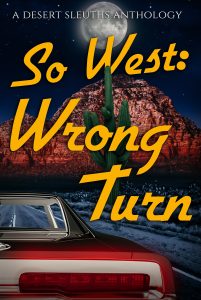Having finished novels 100 to 54, Karen and I are nearly half way through The Bestseller Code list of 100 bestsellers. We’ve decided to summarize our results so far in a Q and A format. (Links go to our reviews and landing pages).
What was your favorite and least favorite book from the list, and why?
Roberta: My least favorite book from the list is the easiest to pick. I despised the main character in Cross Roads by Wm. Paul Young so much I couldn’t get past the first part.
My favorite is more difficult. If I disregard the three authors I had already read and knew I enjoyed (The Cuckoo’s Calling by Robert Galbraith, The Girl Who Kicked the Hornets’ Nest by Stieg Larsson, and anything by John Sandford), my favorite that I discovered by reading the list is The Silent Wife by A. S. A. Harrison. I loved the sparse language and the ability of the author to keep readers on the edge of their seats even though the ending was revealed in the second paragraph. Or was it?

That said, I had several close runner ups.
Karen: My least favorite book was the same as Roberta’s, Cross Roads by Wm. Paul Young, for much the same reasons. I only finished the book because I wanted to see if it would ever improve (it did not). The main character was so horrible that you had no sympathy or empathy for him and the second portion of the book read more like science fiction rather than Christian fiction. It was a total waste of my time.
Two other books deserve dishonorable mention in the “least favorite category” – The Klone and I by Danielle Steel and The Choice by Nicholas Sparks.
I had several favorite books and really could not choose just one. It was a three-way tie for first place between Hotel on the Corner of Bitter and Sweet by Jamie Ford, And The Mountains Echoed by Khalid Hosseini, and Orphan Train by Christina Baker Kline. They all fall in the Historical Fiction genre, so it’s no surprise they were my favorites. Each gave me insight into specific events and time periods, leading me to do more research on my own. It didn’t hurt that the writing by each author was excellent, with fully developed characters, great descriptions, and moving story lines. Enjoyable all the way around.

I had a two-way tie for second place between The Girl Who Kicked the Hornet’s Nest by Steig Larrson and The Weight of Silence by Heather Gudenkauf. One is a suspense novel, the other Crime/Mystery/Thriller. Both of these books kept me up way too late at night reading!
Two books deserve special mention because I find that when reviewing the list of books read, I remember absolutely nothing about them — Unaccustomed Earth by Jhumpa Lahiri and The Weird Sisters by Eleanor Brown. They were that unmemorable.
Has this reading challenge changed your reading selection process?
Roberta: If anything, it has made me less interested in picking up a bestseller. The words “bestselling author” on the cover aren’t as impressive as they once were, and instead I look for careful, reasoned reviews and recommendations of readers I trust.
Karen: Where before my fiction selections were usually historical fiction and spy thrillers, I find I now also look for crime/mystery/detective novels. I especially enjoyed Easy Prey by John Sandford and have begun reading that complete series. And, as Roberta stated above, I’m less interested in a book if it is a bestseller. I also disliked most of the novels that had won any sort of literary award.
As a writer, what have you gleaned from doing this challenge that has helped your own writing?
Roberta: That is a great question.
Rather than learning any specific writing techniques, I learned that many of the best novelists break all sorts of “rules.” For example, there were novels (like Lovely Bones) that began with the highest level of drama instead of having the standard rising conflict with a climax at the end. The Girl Who Kicked The Hornet’s Nest by Stieg Larson had pages of solid dialogue without a single dialogue tag. Some of the authors did more telling than showing. The bottom line is good storytelling is about more than simply following certain conventions.
I have also discovered that writing with a distinctive voice is something to strive for. I tend to try to play it safe, tamp down my voice, and keep to norms. The best novels turn the norms upside down.
For a few of the novels, the storytelling was so smooth and effortless, the writing disappeared from my consciousness. I was completely engrossed and hardly realized I was reading. I haven’t figured out how to do that yet, but I’d love to be able to achieve it.
As a reader, what have you gleaned from doing this challenge that has impacted your reading?
Karen: This challenge has broadened my scope of reading genres and exposed me to new authors I might not have discovered on my own. It’s also led me to the realization that I don’t need to require myself to finish reading a book if it is not up to my expectations. There are a lot of mediocre books out there, even if they are bestsellers, and so if it’s not working for me early on, I can set it aside and move on.
What has surprised you most about the books we’ve read?
Roberta: I was surprised how many of the novels I didn’t like or felt were poorly written, especially some of the ones that won literary prizes. Naively, I thought bestsellers would appeal to a broad range of readers and so I’d like the majority on the list. Now I realize novels might make the bestseller lists through marketing, luck, or good timing rather than because they have superior writing or storytelling.
That said, I also admit that forcing myself to read the books during a two week window for the challenge might also have soured me to some of the books. I wasn’t always in the mood to read a particular genre when it was assigned.
Karen: Again, like Roberta, I experienced surprise at how many truly awful books make the bestseller list (public acclaim) or receive awards (literary acclaim). Two examples are Fifty Shades of Grey by E. L. James and Olive Kitteridge by Elizabeth Strout. Either that, or my tastes run completely opposite those of the general reading public and/or literary prize committees.
Have you learned anything about what makes a novel a bestseller from reading the list so far?
Roberta: The main take away I’ve had so far is that it isn’t the quality of writing that makes a novel a bestseller, but having a fresh perspective and/or a fresh story that really makes them stand out. Readers seem to like a bit of novelty, for example books about a zombie apocalypse (World War Z by Max Brooks), a love story featuring a quadriplegic main character (Me Before You by JoJo Moyes), a novel told from the perspective of a dog (The Art of Racing in the Rain by Garth Stein) or from the perspective of a dead girl (The Lovely Bones by Alice Sebold).
Having a distinctive voice also helps.
Karen: Besides having a loyal fan base that will snatch up your newest release without waiting for a review and thus potentially creating a bestseller when it should have been a dud?
Two things stand out in the bestsellers that I’ve truly enjoyed:
- Memorable characters, such as Lisbeth Sanders – she was a complex character that stayed with me long after I finished The Girl Who Kicked the Hornet’s Nest.
- Easy flowing dialogue with a lot of human interaction, such as I read in A Day Late and A Dollar Short by Terry McMillan. The voices of those characters rang true in the dialogue and I quickly came to care about their lives.
__________________
What are we reading next?
We’re taking a break until November.
We have decided to take a short hiatus from the Bestseller 100 Challenge. Both of us have other commitments and aren’t able to put in the time and attention the project requires. We will be sure to let you know when we start this challenge back up so you can read along with us. The second half of the 100 Book List includes some of our favorite (and some very popular) authors, such as J.K. Rowling, Dan Brown, Barbara Kingsolver, Jodi Picoult, and Tom Clancy. We hope you will join us at that time.




Karen,
It has been quite an experience reading all these novels. I’m glad we got to do it together.
By the way, The Weight of Silence was a close second for my favorite, too. It was one of those novels that I felt like I lost myself in. And I absolutely agree with the last part about the two things that stood out for you. Terry McMillan’s dialogue was great.
Kudos!